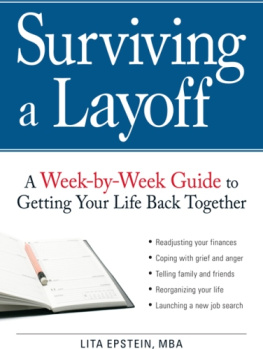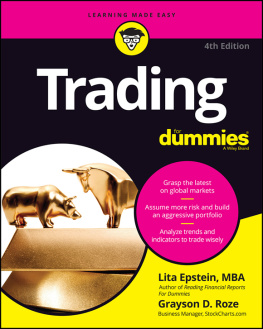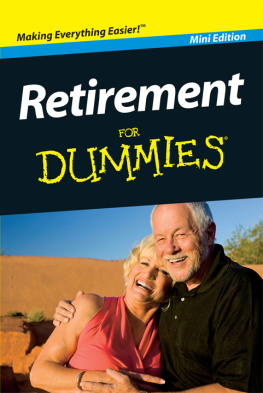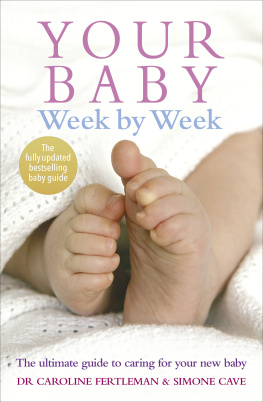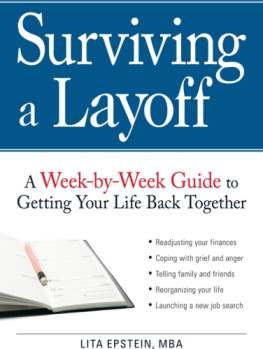First I want to thank Peter Archer at Adams Media for his support of my work and for giving me the opportunity to do this book. I also want to thank the editorial staff at Adams Media for their work in getting this book ready for publication, including Wendy Simard and Casey Ebert. Finally, I want to thank my agent Jessica Faust, who's helped me over the years to succeed as an author.
Introduction

W E ALL NEED to accept the fact that being laid off is just a part of the lifestyle in the United States. Most people will be laid off at least once in their lifetime and many will be laid off multiple times. In my circle of family and friends almost all of the people I know have been laid off at least once unless they work for their state or hold a federal job. And even those people are not as secure as they used to be as local and state government agencies face significant budget cuts. I do know one person, my brother, who has worked in the same company since getting his B.S. in engineering, but that is more the exception than the rule.
At the time of writing this book, the U.S. Department of Labor announced that mass layoffs in June 2008 were the highest since 2003 with 165,697 workers laid off that month. The numbers can be expected to rise. Unemployment was at 5.5 percent, but that doesn't represent true levels of unemployment as many people must take jobs at a much lower salary than they had been earning in their previous job just to put food on the table. Others take part-time jobs, and yet others just give up looking for work completely. Some estimate the jobless rate in this country is closer to 10 percent if one considers the underemployed and those who have given up looking.
You may be wondering what the point is in reviewing all of this bad news. If you're recently laid off, I simply want to assure you that you are not alone. You're part of what is becoming the norm for the U.S. labor market, so don't think you've done anything wrong. Just take some time to heal from the wound of losing your job and then get back in the saddle and look for a new job once you've taken the time to figure out what that new job should be.
In this book we'll sort through the loss and then help you sort out what you should consider doing next. Don't start looking for your next job right away. Take some time to think about what you want to do and where you want to live. Take time to work through the anger and loss of being laid off before you start looking.
Some people make the mistake of jumping into a job search too soon. If you do so, that will only hurt your chances of finding the right job for you or finding any job at all. You have to work on yourself before you can start looking to find a new job.
I know. I'm talking from the experiences of surviving three layoffs in my lifetime. As I look back over my career, I realize the layoffs presented opportunities for me to look at what I'd been doing and figure out my next steps. Layoffs didn't hurt my career; instead, they helped me to focus it in new and better directions that ultimately helped me to get to the point where I am today doing what I love to do.
My first layoff happened after I worked for a couple of years at a university center that was on soft funding in other words, a foundation grant. When the grant was about halfway through, the center applied for new funding and was unsuccessful in winning an additional grant. Staff was cut and since my salary was fully funded by the grant that was ending, I was let go.
I knew the layoff was likely and once we got the rejection from the foundation I knew I was out the door. But I was young and foolish and didn't do anything to set myself up for my next position. I learned the hard way to always be thinking about what I want to do next. I learned to carefully build a network of contacts and keep that information at home. I learned to keep copies of my successful projects at home so I could easily reference them or present them during an interview.
Unfortunately, these are the mistakes many people make. We're encouraged to be loyal to the company we work for, but can't expect the same loyalty from that company. If the top executives need to improve the company's profit margin, they must focus on the bottom line; and not on the lives of the people they plan to lay off. Too often you hear of companies laying off employees while large bonuses or raises are voted in by the Board of Directors for the top executives. Often a manager is rewarded if they can reduce head count, cut costs, and still get the job done. The people left behind are usually overworked and, with new overtime rules, forced to work longer hours without extra pay.
Loyalty toward a company today is dead. Yes, you should do a good job, but always keep your eye on yourself and what's best for your career.
By the time I got to my third career layoff I had done my homework and felt prepared for the blow. I was working for a dot-com. We'd celebrated a successful month. Staff was growing. We were off between Christmas and New Year's and when we came back I was called into the owner's office and laid off.
I didn't see any signs of a problem. The owners had expected to receive funding from a new angel, but the funding fell through. The dot-com bubble had burst and money was in short supply. I was offered a decent severance package of one month's income plus vacation time, provided I agreed to sign over my stake in the company. I took the money and ran. Within six months all but the owners had been laid off. The rest were not offered a similar severance package.

